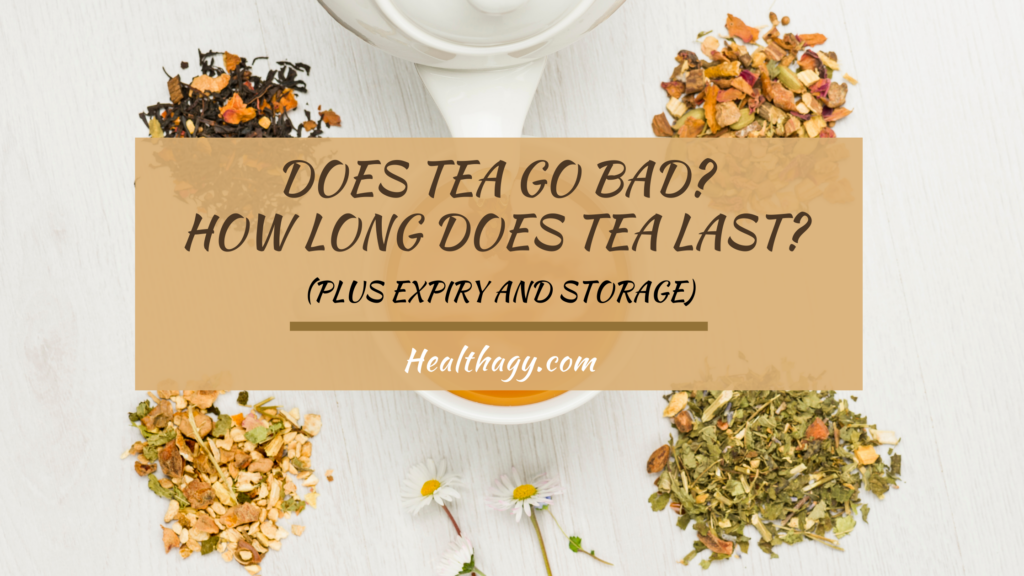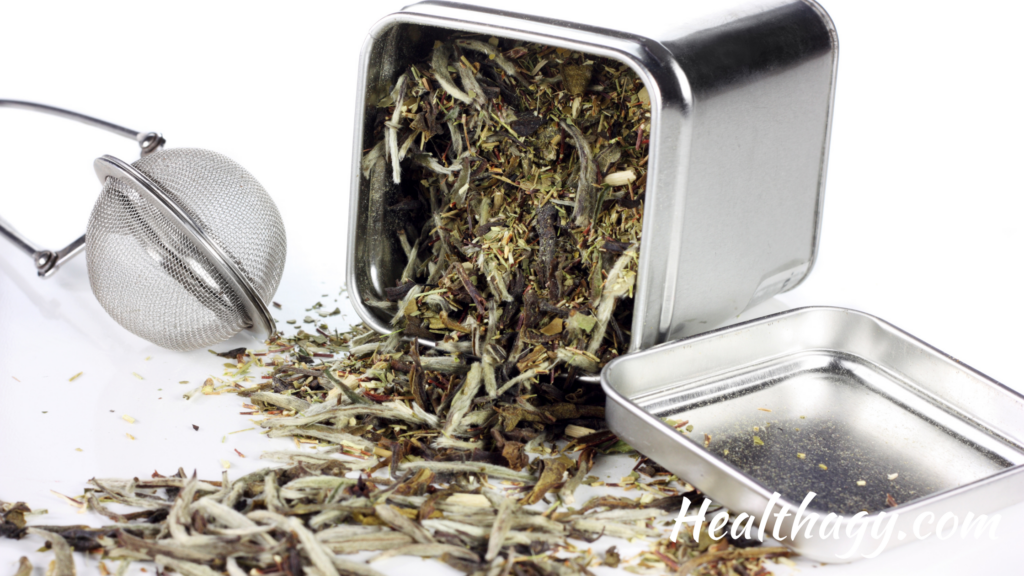
I’m a tea lover! I drink at least 3-4 cups a day, often more. I’m even known to travel with a cup of tea, never leaving home without a travel mug in hand. The flavor, the aroma, the slow sips, the comforting warmth; tea helps keep me hydrated and calm. Not to mention tea is known to be full of health benefits!
I’ve been on a cleaning kick lately, and I’ve gotten to my cupboard of tea. Although I drink quite a bit of tea every day, it’s hard to get through all the different flavors of teas I have. I’ve also lost track of how long I’ve had many of these teas. And not to mention, I’m often being gifted new teas or finding a tea I love.
If you too have found yourself with tea that’s been in your pantry for a long time, you may be left wondering: How long does tea last? Does tea expire? What is the best way to store tea? And How to tell if tea has gone bad?
Does Tea Go Bad?
Yes, tea can go bad. Tea can deteriorate in quality, flavor, and aroma over time, leaving it tasting bland, flavorless, and unenjoyable. Tea can also go bad through spoilage. If tea is exposed to conditions such as light, heat, air, and moisture during storage, spoilage will likely occur. Spoiled tea may be discolored, have a foul smell, or show signs of mold.
How to Tell if Tea Has Gone Bad?
There are two things to look at in terms of tea going bad. It has spoiled through exposure to conditions such as light, heat, air, and moisture. In which case, the tea may become rancid, discolored, grow mold, etc. The other is that tea has gone bad due to a deterioration in flavor and aroma, leaving the tea consumable but not enjoyable.
The best way to tell if tea is still drinkable is by smelling it. Fresh, good tea has a pleasant, strong aroma. Over time, that aroma will diminish if tea is of average quality and/or not stored well.
If your dry tea or your brewed tea ever has an unpleasant smell or look to it, you don’t want to drink it. If it seems to smell ok, a small sip should confirm if it is still good. If it is unpleasant, musty, or off-tasting at all, it’s best to toss it.
You also want to notice the look of your dry tea for any signs of spoilage. Tea that has faded in color over time has become discolored or shows any signs of spoilage, mold, or anything that seems off are signs that it has gone bad and should be tossed. When in doubt, it’s best to toss it. It’s just not worth the risk.
Does Tea Expire?
The short answer is no; tea does not expire. Some tea gets better with age, and some deteriorate with age depending on the quality of the tea and storage conditions.
Tea leaves, in general, don’t really expire. Pre-packaged store-bought tea may be marked with an expiration date or best by date, but it’s more of a guideline as to when the quality will begin to decline, and the tea will lose its flavor, especially if it’s not stored in a way that maximizes freshness. Teas will typically last about 6 months or so after the expiry date.
High-quality tea does not expire. When stored well, it typically gets better with age- like a high-quality fine wine. In China, aged tea is very common. The most popular one is pu-erh, a fermented tea often sold as a tea cake or tea brick—several other high-quality aged teas that are common are red, black, oolong, and white teas. Green and yellow teas can be aged, but they are the least common to be aged.
How Long Does Tea Last?
In short, an average store-bought tea kept in the pantry or cupboard is likely to last about 12-24 months. For unopened or tightly sealed tea, you may be able to get about 2-3 years for shelf life. High-quality teas, pu-erh tea, and other aged teas may last for years or even decades when stored properly.
How long a tea lasts depends on the type of tea, the quality of the tea, and how the tea is stored.
Let’s look at the shelf-life of few different tea types of average quality store-bought teas that may lose flavor over time. Fermented teas tend to have a longer shelf life than unfermented teas.
Black Tea: Black teas such as English breakfast and earl grey are said to have a longer shelf life than green tea. Black tea is fermented and has a shelf life of about 2 years or more with proper storage.
Green Tea: Green tea leaves have a shelf life as they are unfermented. This gives green tea about 12-18 months before the flavor begins to diminish. With better storage, it may last about 2-3 years.
Yellow Tea: Yellow tea will store for about 18-24 months as it is lightly fermented.
Oolong Tea: Oolong teas are semi-fermented. The shelf life of oolong tea is about 18 months to 2 years.
Herbal Tea: Herbal teas are technically not tea. They are dried flowers, herbs, and spices. Shelf-life can be expected to be about 2 years, typically.
Over time these average teas will lose their natural flavor, aroma, and the natural oils begin to evaporate, thus diminishing the aroma and flavor of the tea. The tea remains consumable but unenjoyable.
If you have high-quality tea, a pu-erh, or other teas that are intentionally aged, then it’s entirely a different story. When stored properly in an airtight container or tea tin in optimal conditions away from light, heat, air, and moisture, the tea may last several years, even a decade or longer! Aged teas are particularly popular in China for their complex flavors and a richer taste developed over the aging process.
The benefit of aged tea is that the tea leaves may contain added health benefits, richer flavor, and more complexity after a few years. A Chinese proverb says, “It is tea in the first year, medicine after 3 years, and a treasure after seven years.”
If you happen to have high-quality tea stored well and give it a good smell, you may have a nice surprise, having unknowingly turned your tea into a perfectly aged tea!

What is the Best Way to Store Tea?
The real bottom line for how long tea lasts comes down to the quality of the tea and storage conditions. The better the storage conditions, the longer tea lasts. Proper storage conditions for tea are important to maintaining peak quality and freshness, not to mention giving your tea a longer shelf life. The best way to store loose tea is in a tea tin.
A tea tin is a sealed container that protects the tea from light as well as moisture. If you go into a gourmet tea shop, you’ll notice the teas are typically kept in a tin storage container or a ceramic storage container. They will often package your tea in an aluminum or tin plate-lined bag. Good quality bagged teas purchased at the store also often have a tin-lined container or tin-lined bag to retain freshness by protecting tea from moisture, oxygen, and sunlight. Tea should be stored at room temperature or slightly below room temperature.
Regarding glass containers, they aren’t recommended as a good idea as they allow sunlight to penetrate the tea leaves, which damages the tea over time. It is best to store tea in an airtight container that blocks light, like a tea tin or ceramic container.
The best storage conditions for tea are to store at room temperature or slightly below, in a dark place, out of indirect and direct sunlight, away from heat sources. The tea must also be kept in a dry place, away from moisture, air, and strong odors. For many people storing tea in a tightly sealed tea tin in a kitchen pantry or cabinet will be the best option available.
If your tea is of average quality or has already begun to deteriorate in quality and aroma, even the best storage conditions will not turn it into the best quality or better-tasting tea. Only high-quality teas can be aged. With other teas, proper storage is used to help maximize taste and enjoyment.
What’s the Best Way to Dispose of Old Tea Leaves?
Whether you have loose leaf tea leaves or old tea bags, you can use old tea leaves as fertilizer for plants in your garden, or you can add them to a compost bin. Just be sure to discard any teabags properly.
Up Next:
How Long Does Iced Tea, Sun Tea and Sweet Tea Last?
Karla Kueber is a Certified Evidence Based EFT Practioner and Health Coach, with a double Masters Degree in Education. She works with people to overcome emotional eating, curb cravings, and overcome resistance to eating new healthy foods. You can learn more about coaching with her here.